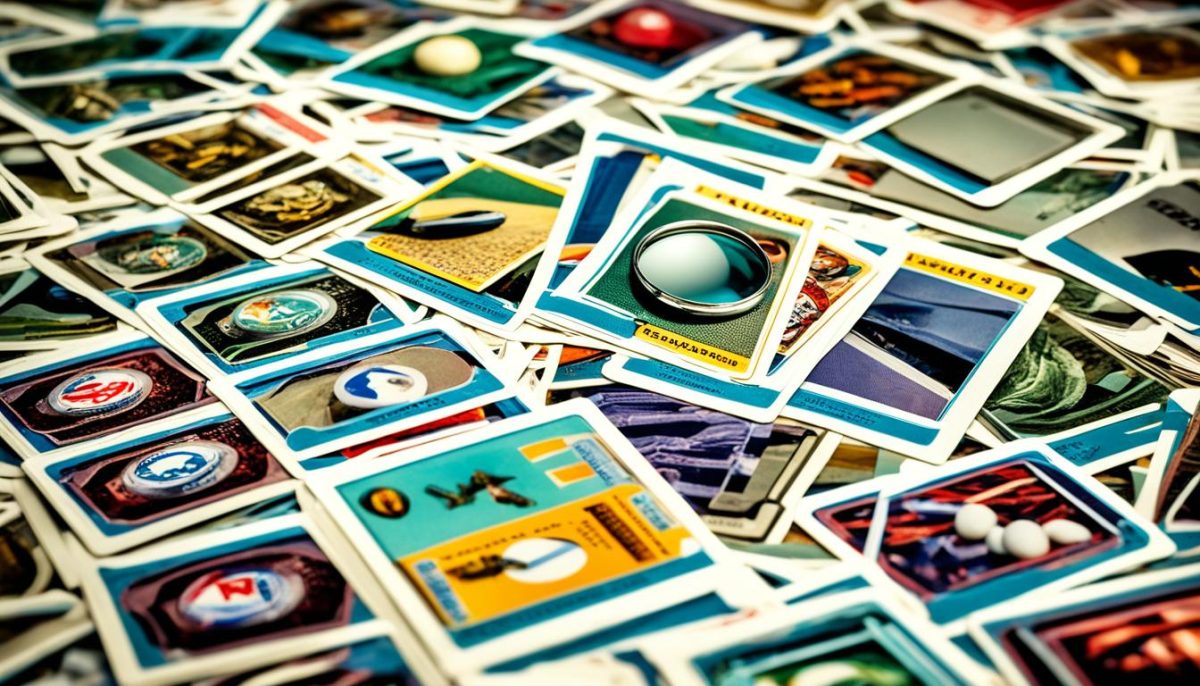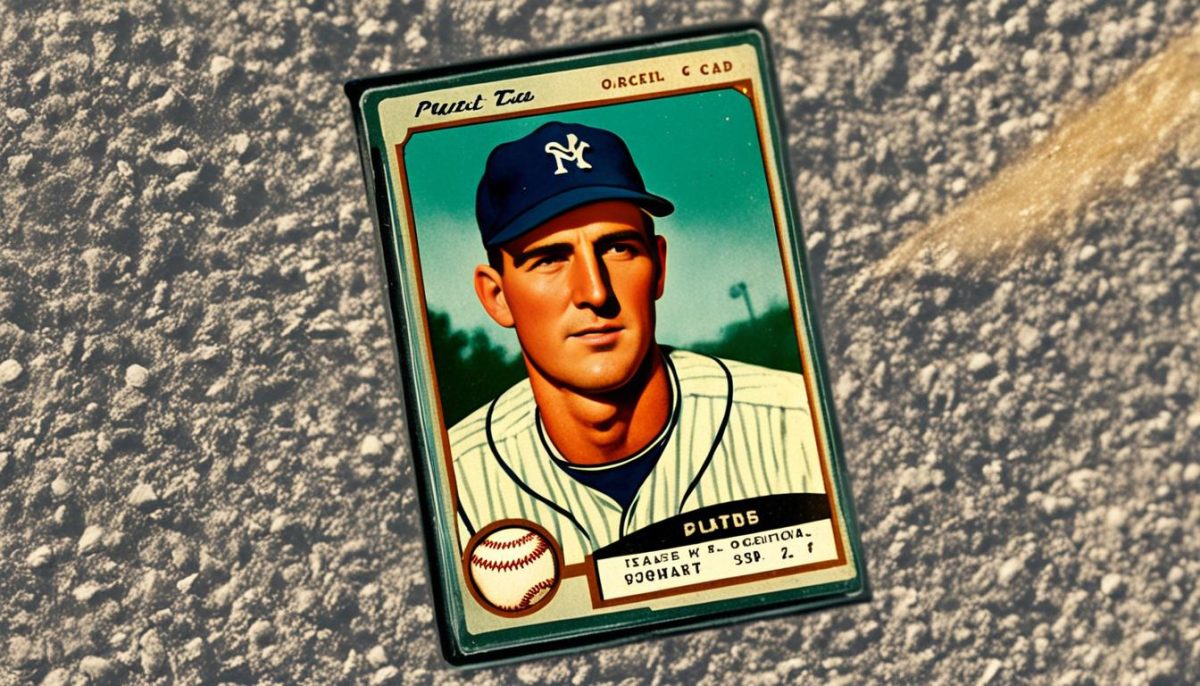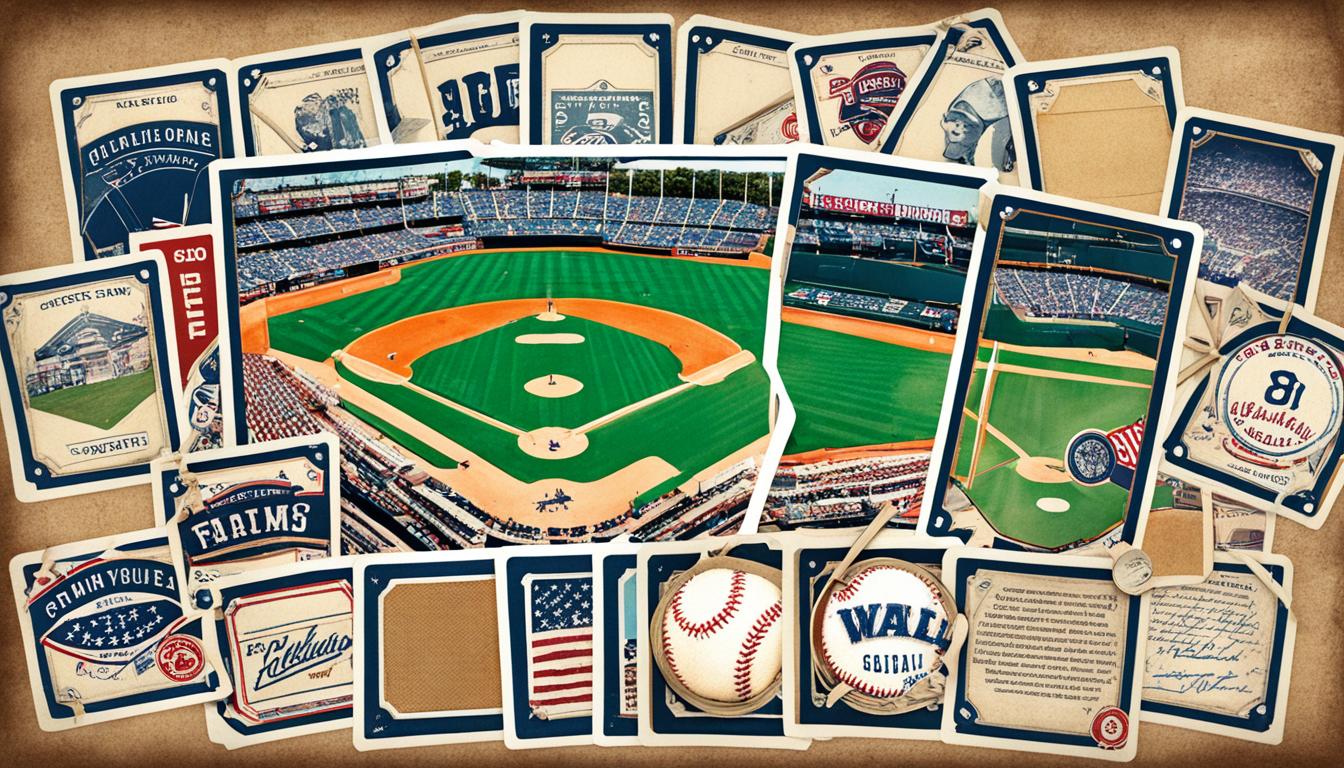Welcome to our article where we will provide essential tips for collectors of baseball relic cards. Whether you are a new or seasoned collector, these tips will help you find and preserve rare baseball relics, enhance your premium sports card collection, and discover unique baseball card artifacts.
Baseball relic cards are a fascinating category of vintage baseball memorabilia. They are authentic baseball collectibles that feature limited edition baseball cards with unique artifacts, such as game-used jerseys, bats, or other equipment from the most legendary players in the history of the sport. Each card is a piece of history, imbued with the spirit of the game and the achievements of the players.
As collectors, we understand the thrill of owning these exclusive baseball card finds. That’s why we want to share our expertise with you, providing valuable insights into the world of baseball relic cards. Our tips will guide you in choosing the right baseball cards to collect, researching and buying them wisely, properly storing and preserving your prized collection, and building a vibrant community of fellow collectors.
By following these tips, you will be well on your way to building a remarkable premium sports card collection that showcases the unique history and artistry of baseball relic cards. So, let’s dive in and embark on an exciting journey into the world of vintage baseball memorabilia!
The Different Types of Collectors in the Hobby
When it comes to collecting baseball cards, there are different types of collectors in the hobby.
New collectors are individuals who are just starting their collecting journey and may need guidance to avoid scams and make informed decisions.
Investors are collectors who view cards as a financial investment and bring significant interest and money into the hobby.
Card flippers are like day traders, buying and selling cards for short-term profits.
Renewed collectors are those who collected in their youth and have rediscovered the hobby.
Old school collectors are enthusiasts who have been collecting for years and have seen the hobby evolve.

Understanding these different types can help you formulate your collecting strategy. Whether you are a new collector seeking guidance or an experienced collector looking for inspiration, the diverse community of collectors offers a wealth of knowledge and experiences to enrich your journey.
Stay tuned for the next section, where we will discuss how to choose the right baseball cards to collect and enhance your collection.
Choosing the Right Baseball Cards to Collect
Before diving into the world of baseball card collecting, it’s crucial to consider various factors that will help you choose the right cards to add to your collection. By taking into account your sporting interests, the manufacturers, brands, and different card types available, you can focus your collection and make informed decisions.
1. Sports
Start by determining which sports capture your interest the most. While baseball is the focus of this article, other popular sports like basketball and football also have card collections available from manufacturers like Panini.
2. Manufacturers
When it comes to baseball cards, Topps is the primary manufacturer to look out for. With a rich history and a vast selection of sets, Topps offers a wide range of options for collectors. For enthusiasts of other sports, different manufacturers cater to those specific markets.
3. Brands and Sets
Within each manufacturer’s portfolio, you’ll find different brands and sets released each year. These brands can vary in terms of design, features, and rarity. Whether you prefer classic designs or modern aesthetics, exploring different brands and sets can help you find the perfect fit for your collection.
4. Types of Cards
Baseball cards come in various types, each with its own appeal and significance. Consider the following card types when building your collection:
- Base Cards: The foundation of any card set, featuring the player’s photo and basic information.
- Subsets: Specialized sets within a larger card collection, focusing on specific themes or groups of players.
- Rookie Cards: Highly sought-after cards featuring a player’s first year in the major leagues.
- Insert Cards: Unique cards inserted in packs to provide additional excitement and value.
- Parallels: Variant versions of base cards, often featuring different colors or designs.
- Autographs: Cards signed by the players themselves, adding an extra level of authenticity.
- Relic Cards: Cards that contain pieces of game-worn memorabilia like jerseys or bats.
No matter your preference, understanding these different card types will help you create a diverse and engaging collection.
By considering the sports you love, the manufacturers and brands that produce high-quality cards, and the different card types available, you can choose the right baseball cards that align with your collecting goals. Each card you add will contribute to a curated and meaningful collection that reflects your passion for the sport.
Researching and Buying Baseball Cards
Research is a crucial step to take before purchasing baseball cards. To ensure you make informed decisions and build a high-quality collection, we recommend utilizing online resources, reading books about collecting, and seeking advice from experienced collectors or card dealers.
When it comes to buying cards, it’s important to purchase from reputable buyers. Whether you choose to visit a local card shop or make an online purchase, conducting proper research is essential.
For online purchases, we advise checking the seller’s ratings and reviews to ensure reliability and trustworthiness. Consider platforms such as eBay that offer seller ratings and allow buyers to leave feedback. This will help you make confident decisions when purchasing cards.
If you prefer buying from a local card shop, we recommend finding a reputable establishment that has been in the industry for some time. Established card shops often have experienced staff who can provide guidance and offer a wide selection of cards.
Pro Tip: Purchasing graded cards can provide additional assurance of authenticity and condition. Trusted grading services like PSA thoroughly assess cards and assign them a grade based on their condition and quality.
The Benefits of Purchasing Graded Cards
Purchasing graded cards offers collectors several benefits. Firstly, they provide an independent evaluation of the card’s condition, ensuring that the card meets industry standards. This can help you avoid purchasing counterfeit or altered cards. Secondly, graded cards are securely encapsulated in tamper-evident holders that protect them from damage, ensuring long-term preservation. Finally, graded cards have increased market value and are highly sought after by collectors, making them a valuable addition to any collection.
By conducting thorough research and buying from reputable buyers, whether it’s a local card shop or an online seller, you can confidently add high-quality baseball cards to your collection. Remember to consider purchasing graded cards for added authenticity and protection.

Sources and Resources
- PSA – Professional Sports Authenticator: Official website and grading service
- eBay: Online marketplace for buying and selling cards with seller ratings
Proper Storage and Preservation Techniques
Proper storage is essential to protect and preserve your baseball card collection. By following these storage and preservation techniques, you can maintain the value and quality of your cherished cards.
1. Card Storage Options
Consider using binders with pockets or hard plastic sleeves and boxes to store your baseball cards. These options provide protection from dust, moisture, and other potential damage.
2. Binder Storage
- Select a binder with acid-free and archival-quality pages.
- Organize your cards in the binder by team, player, or set to facilitate easy access and browsing.
- Avoid overstuffing the pockets to prevent bending or creasing of the cards.
3. Hard Plastic Sleeves and Boxes
- Use individual hard plastic sleeves to protect valuable and delicate cards from scratches and fingerprints.
- Place the sleeved cards in a sturdy card box for additional protection during storage.
Pro Tip: Invest in card storage supplies specifically designed for long-term preservation, as they offer superior protection.
4. Avoid Sunlight Exposure
Keep your cards away from direct sunlight to prevent fading, discoloration, and other damage. Sunlight can degrade the quality of the cards, affecting their overall value.

5. Control the Storage Environment
- Store your cards in a cool and dry environment to minimize the risk of mold, mildew, and warping.
- Avoid storing cards in basements, attics, or areas prone to temperature and humidity fluctuations.
| Storage Method | Advantages | Disadvantages |
|---|---|---|
| Binders with Pockets | – Easy organization – Allows for easy browsing – Protects cards from dust and moisture |
– Bulkier storage option – Pockets may lead to bending of cards if overstuffed |
| Hard Plastic Sleeves and Boxes | – Provides maximum protection – Ideal for valuable and delicate cards – Compact storage option |
– Requires additional space for card boxes – Sleeves can be time-consuming to insert cards |
By implementing these storage and preservation techniques, you can ensure the longevity and condition of your baseball card collection. Remember that proper storage enhances the overall value and enjoyment of your prized cards.
Building a Community of Collectors
Building a community of collectors is a vital aspect of the baseball card collecting hobby. Connecting with fellow enthusiasts allows us to learn, share experiences, and expand our knowledge. By joining online forums and Facebook groups dedicated to collecting baseball cards, we can engage in discussions with like-minded individuals from around the world.
“Being part of a community of collectors has enriched my collecting journey beyond measure. I have learned so much from fellow collectors, discovered rare cards I would have otherwise missed, and built lasting friendships.” – Alex Johnson, avid baseball card collector
These online forums and Facebook groups provide platforms for us to ask questions, seek advice, and gain insights into various aspects of baseball card collecting. We can discuss card values, share recent finds, and even trade or sell cards within the community.
Local Card Shops and Card Dealers
Visiting local card shops is another fantastic way to build our collector community. These shops not only offer a wide range of cards and supplies but also serve as gathering places for collectors of all levels. By engaging in conversations with other collectors, we can learn from their experiences, discover new collecting strategies, and even collaborate on group projects or events.
Connecting with Card Dealers
Interacting with card dealers can be a valuable source of knowledge and insights into the hobby. These professionals are well-versed in the industry and can provide guidance on collecting trends, card values, and market fluctuations. Establishing relationships with card dealers allows us to stay informed about upcoming releases, exclusive offers, and potential investment opportunities.
Overall, building a community of collectors through online forums, Facebook groups, local card shops, and card dealers enhances our collecting experience and expands our network. By connecting with others who share our passion for baseball card collecting, we can continually learn and grow as collectors. Together, we create a supportive and dynamic community that celebrates the beauty and history of baseball through its collectibles.
Exploring Different Types of Baseball Cards
Baseball cards are available in a variety of types and formats, catering to the diverse preferences of collectors. From the traditional base cards that can be found in every set to subsets, rookie cards, insert cards, parallels, autographs, and relic cards, there is an extensive range to explore and add to your collection.
If you appreciate the timeless appeal of classic base cards, which are the foundation of any card set, you can focus on acquiring these foundational pieces that often showcase players’ poses or team logos.
If you’re looking for more specialized cards that spotlight specific aspects or moments in the game, subsets offer a unique collecting experience. These subsets can feature cards dedicated to player statistics, notable achievements, or highlight specific team rivalries and events.
Rookie cards, on the other hand, hold special significance as they represent a player’s first appearance in a card set. Collecting rookie cards allows you to follow the careers of emerging stars and potentially invest in their future success.
Insert cards provide an additional layer of excitement to the hobby, often featuring eye-catching designs, premium materials, or even unique technologies. These cards are inserted into packs in limited quantities, making them highly sought-after by collectors.
Example of an Insert Card:
“The Topps Chrome Refractor set introduces a stunning collection of insert cards that showcase a unique futuristic design, each with its own distinct refractor pattern. These cards have become highly collectible, earning a reputation for their striking aesthetics and scarcity. Don’t miss out on the chance to add these vibrant inserts to your collection!”
Parallel cards
allow collectors to track different variations of their favorite cards. These cards feature unique designs or color schemes but contain the same player or theme as the base card. Collecting parallels adds depth and variation to a card collection, allowing collectors to pursue multiple versions of their most cherished cards.
Autograph cards, as the name suggests, bear the authentic signature of the featured player. These cards are highly prized by collectors and can provide a personal connection to the athletes. Relic cards, on the other hand, contain pieces of game-worn memorabilia, such as jerseys or bats, making them treasured keepsakes that connect fans to the game itself.
Finally, with the rise of digital collectibles, there has been a surge in the popularity of digital baseball cards or non-fungible tokens (NFTs). These digital assets provide a unique and innovative way to own and collect baseball cards in the digital realm.
Exploring the various types of baseball cards allows collectors to curate a collection that reflects their personal interests and collecting goals. Whether you gravitate towards the classic appeal of base cards, the thrill of chase inserts, or the prestige of autographs and relics, the diverse world of baseball cards has something for everyone.
| Type of Baseball Card | Description |
|---|---|
| Base Cards | Main cards in a set, featuring players and team logos |
| Subsets | Specialized cards highlighting specific aspects or moments |
| Rookie Cards | First appearances of players in a card set |
| Insert Cards | Unique cards inserted in limited quantities |
| Parallel Cards | Variations of base cards with unique designs or colors |
| Autograph Cards | Cards bearing the authentic signature of players |
| Relic Cards | Cards containing pieces of game-worn memorabilia |
| Digital Baseball Cards | Digital collectibles in the form of non-fungible tokens |
Evaluating Card Value and Places to Purchase
When it comes to assessing the value of baseball cards, there are a few key strategies to consider. Firstly, consulting a reliable price guide can provide a benchmark for understanding the current market value of different cards. Price guides are essential tools that collectors can use to evaluate the worth of their prized baseball card artifacts.
In addition to price guides, online research and professional appraisal services can offer valuable insights into the value of specific baseball cards. By leveraging the wealth of information available on the internet and seeking the expertise of professionals, collectors can make more informed decisions about their collections.
As for purchasing baseball cards, eBay stands as a prominent platform, offering a wide range of card options for collectors. However, it is crucial to exercise caution and carefully assess prices and seller ratings to ensure a trustworthy buying experience. Alongside eBay, online hobby shops provide collectors with a convenient way to explore and purchase cards, with their extensive product offerings and reliable customer service.
For those seeking unique discoveries, consignment stores and thrift shops can yield exciting finds. These hidden gems can harbor rare and valuable baseball cards waiting to be unearthed by savvy collectors. Exploring consignment stores and thrift shops can be an adventurous and rewarding way to add exceptional pieces to your collection.






